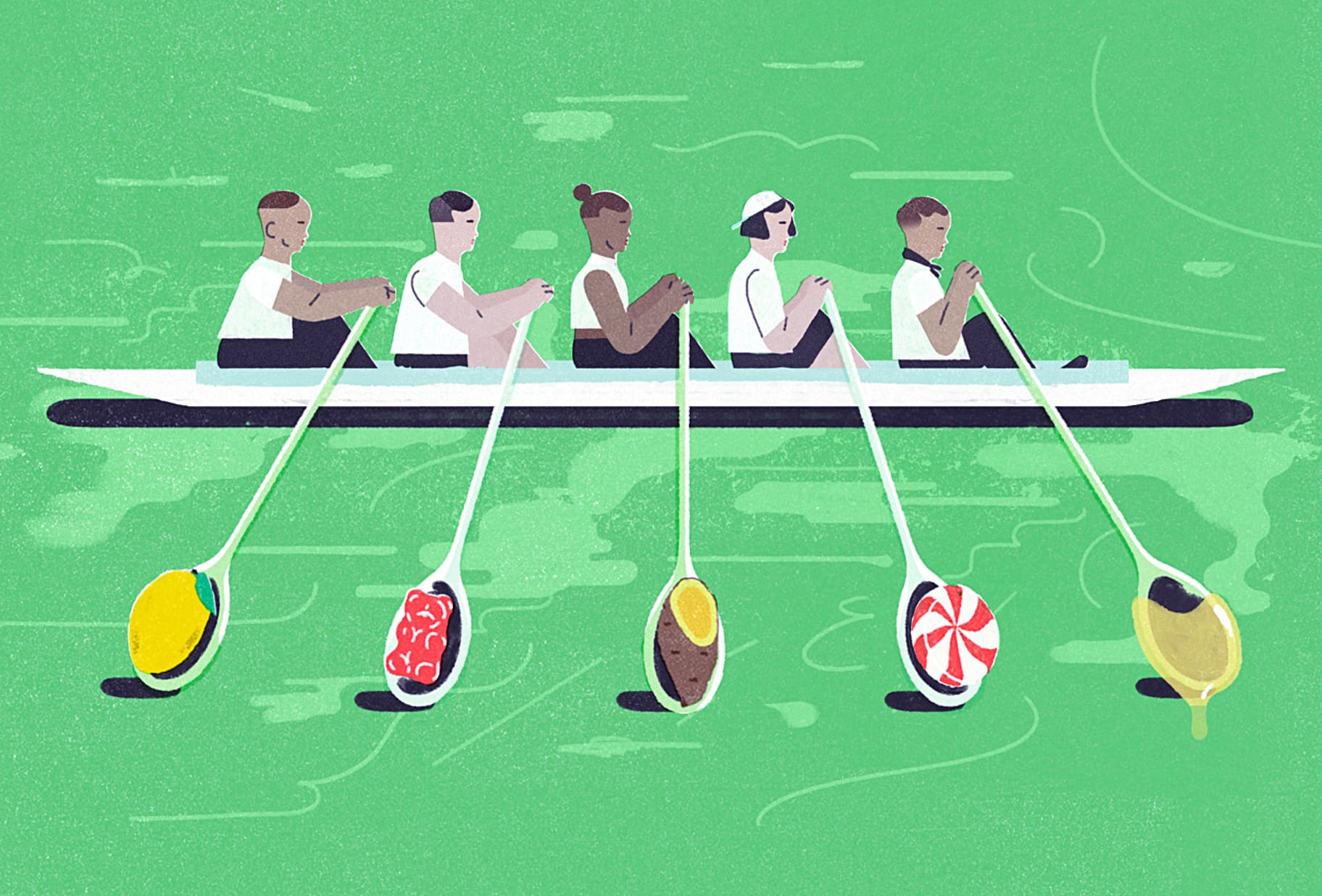Sugar Is Sugar Is Sugar. Or Is It?
Coaching
Experts unpack your body's reaction to different carbs and how you can satisfy your sweet tooth and your desire to be healthy.

A serving of gummy bears has about half the amount of sugar in a cup of sliced mango. But the fruit is obviously the healthier choice. Right? What if those gummy bears were made with all-natural agave instead of high-fructose corn syrup? Should you still grab the mangoes? The answer to both questions is yes.
Here's why: By nature of their chemical composition, all carbohydrates—yes, even vegetables—contain sugar. When you eat or drink carbs, your digestive system breaks down larger sugar molecules into smaller ones so they can be absorbed into the bloodstream, explains certified sports dietitian Lauren Antonucci, RDN, the owner of Nutrition Energy in New York City. Your pancreas then releases insulin, which allows the sugar to enter your cells, muscles and liver, where it's used for energy or stored for future use.
When you overdo it on the sweet stuff (hey, it happens), your blood sugar rises very quickly, provoking your body to rush-produce insulin in an attempt to level things out. Your sugar levels may then decrease rapidly, causing your energy levels to plummet. And if you try to combat the energy slump by eating more sugar, the cycle starts all over, explains Antonucci.
If you regularly overdo it on sugar, the 'future use' supply might get stored in fat cells, which, if you're eating more than your body needs, can lead to weight gain. All of this could help explain why studies have found that cutting back on added sugar (more on that in a minute) can improve your heart health and disease risk, weight management, and even your skin and sleep.
However, whole foods that naturally contain their own sugar—like mangoes—also pack nutrients such as fibre, vitamins, minerals and antioxidants, making them a lighter offence. "The fibre slows the digestive process, so there's not as sharp of a blood sugar spike and crash afterwards", says registered dietitian Jessica Cording, the author of "The Little Book of Game Changers: 50 Healthy Habits for Managing Stress and Anxiety". If you pair the food with a source of protein and fat, like peanut butter or cheese, you'll soften the spike even more, so you get longer-lasting energy.
Studies have found that cutting back on added sugar can improve your heart health and disease risk, weight management, and even your skin and sleep.
When choosing between sweet foods or drinks that aren't as obvious as fruit versus sweets, here are some things to keep in mind.
Avoid Added Sugar
Take a look at any food label and see if it includes added sugar, which means someone (or some machine) literally mixed a form of sugar into the product. With little or no accompanying fibre to balance it out, added sugar—which is in breads, alt milks, dried fruits and way, way more—tends to heighten blood sugar spikes and crashes.
But If You Can't, Go Natural
Back to those agave-sweetened gummy bears. "Your blood sugar will respond similarly to all added sugars", says Cording, including corn syrup, honey, coconut sugar—you name it. That said, natural sweeteners are preferable. For starters, they're less processed than refined sugars are. They also have more depth of flavour, which can make them seem more satisfying than, say, white table sugar. In fact, you can get away with about half to two-thirds as much sweetener in a recipe if you use honey versus traditional sugar, says Cording. Plus, some natural sweeteners have a slight nutritional edge. For example, research suggests that honey has antimicrobial properties, and maple syrup is full of antioxidants, though you'd have to consume quite a lot to reap the full benefits, says Cording.
Find Your Sweet Spot
That's not to say you should never enjoy an ice cream on a hot summer's day. Just try to keep your added sugars to between 6 and 9 teaspoons per day (that's around 25 to 36 grams, or less than 10 percent of your total caloric intake), recommends the American Heart Association. Depending on the brand, a glass of sweetened almond milk in your morning smoothie, a strawberry yoghurt as a snack, and a bowl of pasta with sauce at dinner will get you there. If you'll be exercising for more than one hour, you may need more to fuel your workout: Antonucci recommends 30 to 60 grams of simple carbohydrates (think rapidly digesting liquids or gels) per hour of activity, starting at the one-hour mark.
Fuelling your training with natural sugars, by the way, may be a smart move. In a review of studies published in the journal "Nutrients", researchers found that honey was a good swap for other forms of carbs, giving a similar boost to performance and energy levels when eaten before or during moderate to intense exercise. Maple syrup solutions can also replace sports drinks, other research shows. You can look for these ingredients in drinks, gels and chews, or search for recipes online to make your own.
At the end of the day, a mango will always beat gummy bears, regardless of what's in them. But if you eat healthy, whole and minimally processed foods most of the time, there can be room in your diet for both. That's pretty sweet.

Take It Further
For more expert-backed guidance on mindset, as well as movement, nutrition, recovery and sleep, check out the Nike Training Club App.
Take It Further
For more expert-backed guidance on mindset, as well as movement, nutrition, recovery and sleep, check out the Nike Training Club App.